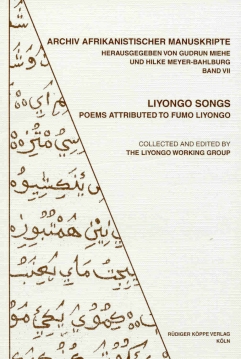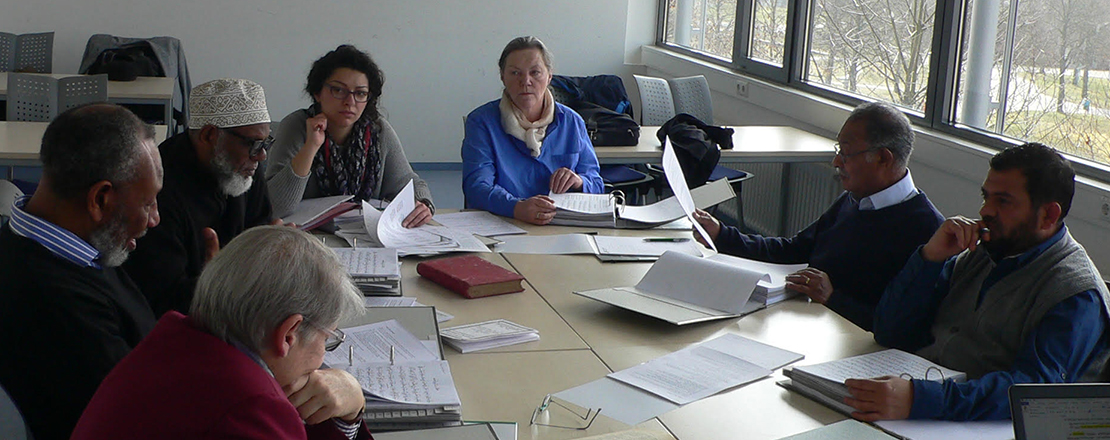



Liyongo Working Group, Bayreuth / London
The present volume contains a collection of texts that – according to the Swahili tradition – are attributed to Fumo Liyongo, the legendary hero and bard. Liyongo is one of the most impressive personalities in the oral and literary tradition of the Swahili Coast. However his historicity has been the topic of many discussions. Nevertheless, the legends of him have become an integral part of the national heritage in this particular region. The oral and written traditions related to Fumo Liyongo fall into several different categories: a prose text, three longer poems in different metres, and several songs mainly praise or dance songs.
The latter form the core of this edition. Nobody knows how far back the oral tradition of the songs presented goes, yet in almost all cases one or more written sources in Arabic script exist. Aiming at a pragmatic solution, this publication presents the canon of the songs in two parts. The first, Part A, contains the reconstructed texts as coming nearest to an assumed archetypal version. The Swahili text is provided with footnotes that explain northern or archaic language forms in Standard Swahili. The English translation follows the lines of the Swahili texts. The second part fulfils the academic needs of a critical edition of the songs. Here, the Swahili versions found in the sources are provided line by line.
The appendix added to the main part of the book is meant to provide additional information on other important Liyongo texts and completes the collection. The presented book is the result of two three-week workshops at Bayreuth University in 2003/2004. During that program the Liyongo Working Group was founded, consisting of local experts on Swahili traditions and academic scholars of Swahili from Kenya, London and Germany.
This collection and critical text analysis will be a welcomed completion of the actual documentation of Swahili literature and of interest to Africanists and Linguists in general.
Under pdf-documents you will find the contents of the edition and some specimen pages.
Review by Ursula Drolc in Afrikanistik und Ägyptologie online 2006
Following these links you will find further Swahili text editions of our programme:
Fumo Liyongo represents one of the most remarkable figures in Swahili culture. He is not only a legendary hero of the Swahili coast, but also a bard, who created own songs and poems. Consequently, the songs attributed to Fumo Liyongo are defined as poetry by and on Liyongo. The eighteen poems and songs chosen as core of the edition originate from different sources: Taylor and Werner/Hichens Collection of the SOAS Archives (London) or Nabahany collection (Mombasa) also some manuscript collected by Dammann from the State Libraries in Berlin and Hamburg and the Library of the Institute of Asian and African Studies in Hamburg. Most of the unpublished manuscripts are in Arabic, only few are in Roman letters. Some anonymous writers of the Arabic script even developed specific diacritics for dental t, which is a typical feature of the Northern Swahili dialects. Hence, the difficulty in analysing these songs consisted not only of the interpretation of the Arabic script but also of the documentation of the ancient language used in the poems. The northern dialects of Swahili are considered more archaic than the southern dialects kiMrima or kiUnguja on the phonological level. Therefore the problem was to decide whether a specific feature of the text is part of the archaic language or whether it simply represents a typical feature of the northern dialects. An outline of the phonology and morphology of the language used in the poems is given in the introduction. The stylistic and cultural aspects of the poems are also dealt with.The edition is an excellent prove of a possible and successful cooperation of various leading scholars in Swahili linguistics, literature, and poetry with local experts on Swahili tradition. [...]
The Liyongo Working Group has achieved the great and difficult task to preserve a very important piece of Swahili cultural heritage and make it accessible.
Uschi Drolc in Afrikanistik-Ägyptologie.online, www.afrikanistik-aegyptologie-online.de/archiv/2006/546, 32-34
© 2026 by Rüdiger Köppe Verlag – www.koeppe.de